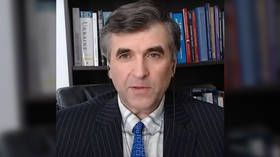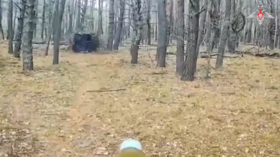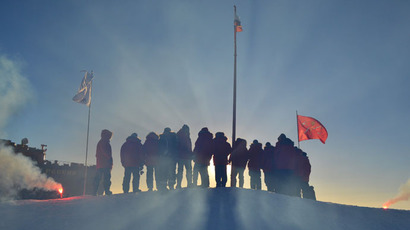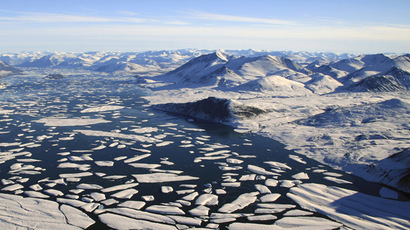Arctic leaders talk tapping riches without ruining environment
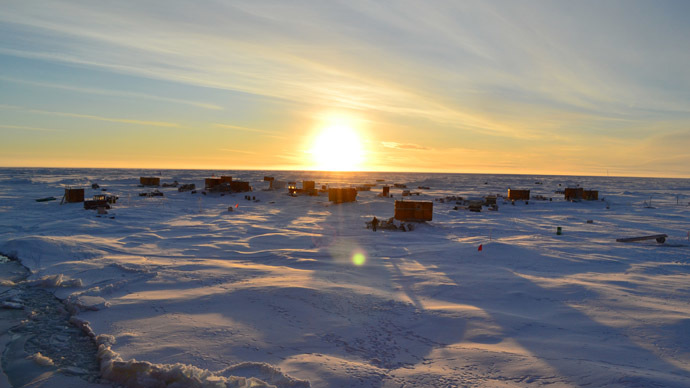
Finding a way to extract the vast riches of the Arctic region without subjecting it to technological disasters is what leaders of Arctic countries, businessmen, scientists and environmentalists discuss at a forum in Russia.
The Arctic is the potential source of natural resources in unparalleled quantities: primarily hydrocarbons, but also fish, fresh water and minerals. Under the frigid waters some 20 per cent of world oil reserves and 30 per cent of natural gas reserves are thought to be awaiting extraction. And the rapid climate change makes those previously economically unfeasible or technologically inaccessible riches more attractive.
Russia’s sector of the region also offers an alternative sea route from the Pacific to Europe: shorter, faster and safe from pirates if compared to the traditional transit through the Indian Ocean and via the Suez Canal to the Mediterranean. The so-called North Sea Route saw a sharp downfall in shipments since the 1980s, but is now experiencing a revival, with China currently probing this option to reach European markets.
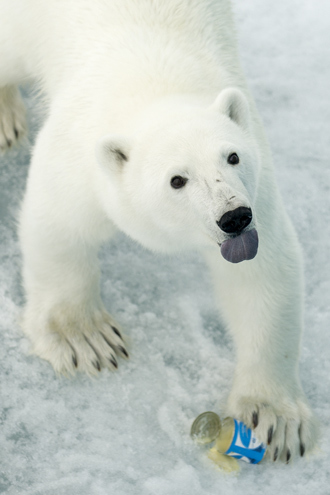
The looming Arctic boom is overshadowed by prospects of conflicts between nations involved. Exact borders between the sovereign zones of Russia, the US, Canada, Norway and Denmark (through its territory of Greenland) which surround the Arctic, are far from defined. Preparing for worst-case scenarios, Russia is currently beefing up its Arctic military forces, including reopening old and building new military bases.
But the third annual international Arctic forum, which Russia is hosting in the northern city of Salekhard, is focused on a different kind of security. Some 700 delegates are visiting the two-day event to discuss possible environmental ramifications of developing the Arctic and the ways to mitigate the damage. The setting for the gathering in Russia’s Yamal-Nenetz region has a symbolic string, being located right next to the North Polar circle.
The forum called “Arctic – Territory Of Dialogue” was organized by the Russian Geographic Society. It is declared a neutral ground free from political debate, where countries, business leaders and scientists may get in touch with each other.
This year’s event sees some high-profile visitors, including Russian President Vladimir Putin, Finnish President Sauli Niinisto and Iceland’s President Olafur Ragnar Grimsson.
Speaking at the forum, Putin pledged to considerably increase the Arctic area, which is protected by the government for its environmental importance. Currently some 6 percent of Russia’s Arctic territories, or about 322,000 sq km, have this status.
“Our plan is to increase the area by several times,” he said.
Putin said Russia is paying a great deal of attention to cleaning up pollution already present in the Arctic. The government has allocated $44.5 million on so-called ‘spring clean’ program.
Another measure of environmental protection is careful selection of companies which would be allowed to develop Arctic oil and gas field.
“The right to extract oil in the ice conditions will only be given to operators, who have tried methods to clean oil spills under ice,” Putin stressed. “We are also considering the creation of a mechanism for financial backing of cleanups of such spills.”
Meanwhile Finland’s President Niinisto called for a comprehensive collaboration between Arctic countries to learn more about ecological balance in the region.
“A comprehensive collaborative research of all the natural resources of the region and its biologic diversity would be a good starting point,” he said.
Environmental aspects of Arctic development are currently in the headlines worldwide thanks to a protest by Greenpeace activists, who scaled a Russian Arctic oil rig last week. Russian border guards detained the protesters and their vessel. Investigators are considering charging at least some of the activists with piracy over the incident, a move that Greenpeace called ridiculous.





